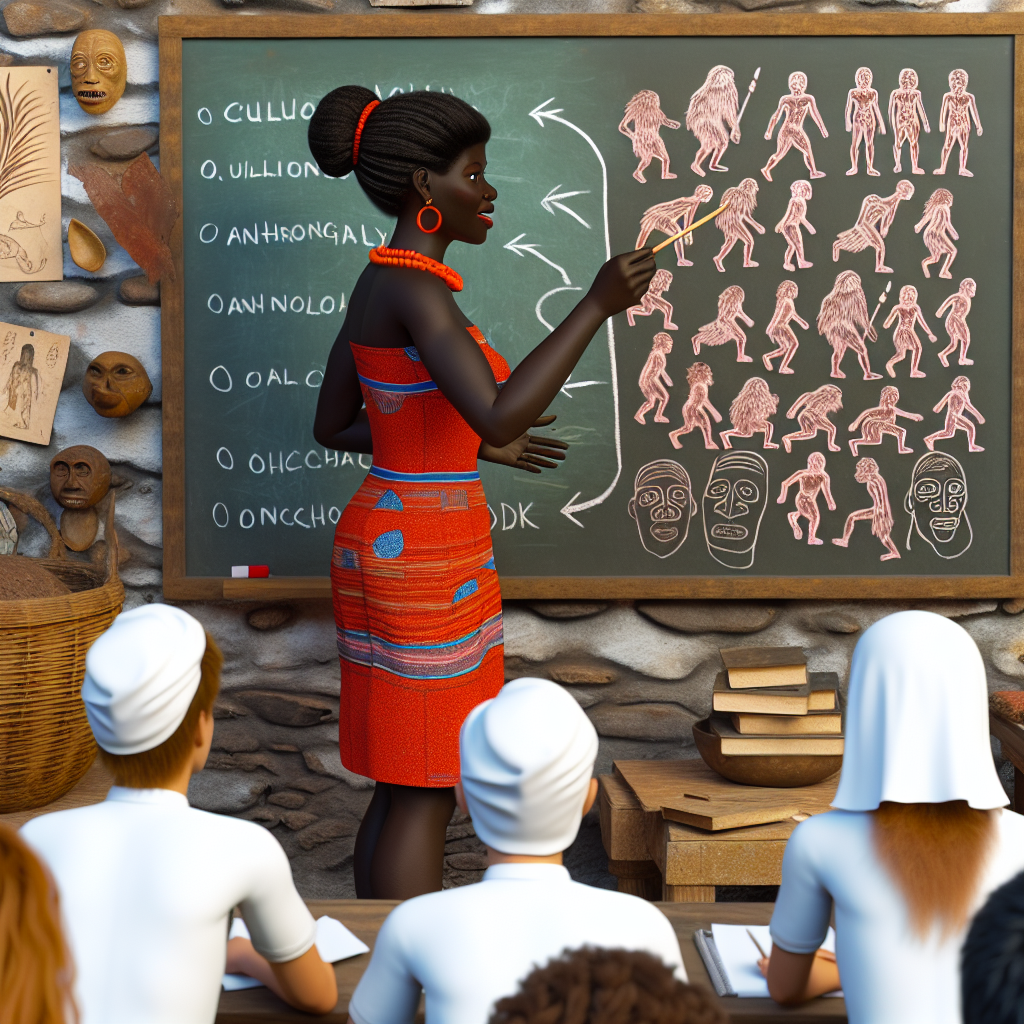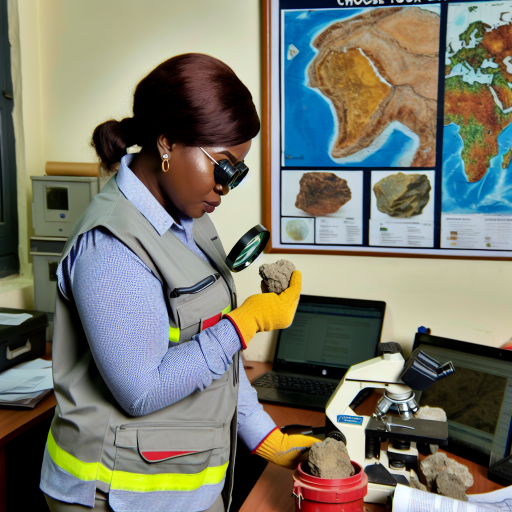Anthropology is a vital subject that should be taught in Nigerian secondary schools.
Understanding human behavior and cultures is essential for personal and societal development.
This blog post aims to discuss the significance of incorporating anthropology into the curriculum and its objectives.
The current state of anthropology education in Nigerian secondary schools:
Anthropology education in Nigerian secondary schools is at a nascent stage, with limited curriculum integration.
-
Curriculum Integration:
-
The teaching of anthropology is not fully integrated into the secondary school curriculum in Nigeria.
-
Lack of Qualified Teachers:
-
There is a shortage of qualified anthropology teachers in Nigerian secondary schools.
-
Resource Constraints:
-
Schools lack resources such as textbooks, teaching aids, and technology for effective anthropology education.
-
Insufficient Government Support:
-
The Nigerian government has not prioritized the development of anthropology education in secondary schools.
-
Low Awareness:
-
Many students and parents are not aware of the importance of studying anthropology in secondary schools.
-
Research Findings:
-
Studies show that only a small percentage of secondary schools in Nigeria offer anthropology as a subject.
The current state of anthropology education in Nigerian secondary schools is characterized by challenges such as lack of curriculum integration, shortage of qualified teachers, resource constraints, insufficient government support, low awareness, and limited availability of anthropology courses. It is crucial for stakeholders in the education sector to address these issues to improve the quality of anthropology education in Nigerian secondary schools. The next section will discuss potential solutions to these challenges.
Benefits of Teaching Anthropology in Secondary Schools:
Introducing anthropology at the secondary school level is important.
It exposes students to diverse cultures and societies.
Learning anthropology can enhance students’ critical thinking skills.
It encourages students to analyze and interpret cultural practices.
It provides students with a unique perspective on human behavior.
This perspective helps them develop empathy and tolerance towards others.
Studying anthropology can also improve students’ research and analytical skills.
These skills are essential in various fields.
By studying different cultures, students can gain a better understanding of global issues.
This understanding fosters a sense of cultural awareness and global citizenship.
Anthropology helps students recognize and appreciate cultural diversity.
It promotes respect for different beliefs and traditions.
The subject encourages students to question societal norms.
They can challenge their own biases as well.
This fosters a more open-minded and critical approach to the world.
Learning anthropology can prepare students for a wide range of careers.
This includes roles in research, education, international development, and cultural preservation.
Students interested in anthropology can pursue further studies in the field.
This can lead to career opportunities as anthropologists, archaeologists, museum curators, or cultural consultants.
The skills gained from studying anthropology are valuable.
These skills include cross-cultural communication and problem-solving.
They are especially important in our increasingly globalized world.
Overall, teaching anthropology in secondary schools can broaden students’ perspectives.
It fosters empathy and critical thinking skills.
Moreover, it prepares them for diverse career opportunities.
Find Out More: Applied Chemistry Alumni Network in Nigeria
Strategies for integrating anthropology into the curriculum:
One effective way to integrate anthropology into the curriculum is by incorporating ethnographic studies into history lessons.
For example, when studying a particular time period, students can also learn about the culture and customs of the people living during that era.
Practical hands-on activities and fieldwork are essential in teaching anthropology.
These methods provide students with a real-world application of the concepts they learn in the classroom.
Engaging in fieldwork allows students to observe and experience firsthand the principles of anthropology.
This engagement makes the subject more tangible and relatable.
One successful program is the National University of Colombia’s Department of Anthropology.
This program offers a comprehensive curriculum covering various subfields of anthropology.
Another example is the University of Cambridge’s Department of Social Anthropology.
Transform Your Career with Expert Guidance
Get personalized mentorship consulting that’s tailored to your unique path. Our expert advice is actionable and exclusive.
Get StartedThis department is known for its research-intensive approach to teaching anthropology.
These successful programs highlight the importance of a well-rounded curriculum.
They also show the value of practical fieldwork and research opportunities in fostering a deep understanding of anthropology among students.
Discover More: Challenges Facing Animal Science Education in Nigeria
Training and resources for anthropology teachers:
Teachers tasked with teaching anthropology need specialized training to effectively deliver the content.
There is a need to provide teachers with appropriate resources such as textbooks, videos, and online courses.
Universities and research institutions can partner with schools to offer teacher training and support programs.
Providing access to these resources will enhance teachers’ knowledge and ensure quality education for students.
Continuous professional development programs should be established to keep teachers updated on the latest anthropological research.
Collaborating with experts in the field will enrich teachers’ understanding of anthropology and its practical applications.
Workshops and seminars can be organized to discuss innovative teaching methods and strategies for teaching anthropology effectively.
Teachers should be encouraged to attend conferences and webinars to network with other educators and share best practices.
Access to online platforms can facilitate self-paced learning for teachers who may not have time to attend traditional training programs.
Funding should be allocated to ensure that teachers have access to the necessary resources needed to teach anthropology effectively.
See Related Content: Nigeria’s Most Promising Science Disciplines You Shouldn’t Ignore

Challenges and Solutions in Teaching Anthropology in Nigerian Secondary Schools
Identifying Common Challenges Faced by Teachers
- Lack of resources: Teachers often struggle with a lack of resources such as textbooks, materials, and technology to effectively teach anthropology.
- Limited training: Many teachers in Nigeria may not have received formal training in anthropology, making it difficult for them to deliver quality education on the subject.
- Large class sizes: Overcrowded classrooms in Nigerian secondary schools make it challenging for teachers to provide personalized attention to students studying anthropology.
- Outdated curriculum: The curriculum for teaching anthropology may be outdated and not aligned with current trends and developments in the field.
- Cultural barriers: Some cultural beliefs and practices may hinder students’ understanding of anthropology, making it a challenge for teachers to communicate effectively.
Proposing Solutions to Address These Challenges
- Curriculum reform: The Nigerian government should update and revise the curriculum for teaching anthropology to make it more relevant and engaging for students.
- Teacher training programs: Implementing training programs specifically focused on anthropology for teachers can help improve their knowledge and teaching skills in the subject.
- Providing resources: Schools and education stakeholders should work together to provide necessary resources such as textbooks, materials, and technology for teaching anthropology.
- Smaller class sizes: Efforts should be made to reduce class sizes to allow for more personalized attention and better interaction between teachers and students.
- Cultural sensitivity training: Teachers can benefit from training on how to navigate cultural barriers and effectively communicate anthropology concepts to students.
The Role of Government and Education Stakeholders
- Funding: The government should allocate sufficient funds to support anthropology education in Nigerian secondary schools, including the provision of resources and training programs.
- Policy support: Education stakeholders should work with the government to develop policies that promote the importance of anthropology education and encourage its integration into the curriculum.
- Collaboration: Schools, NGOs, and other stakeholders should collaborate to create a supportive environment for teaching anthropology, including sharing resources and best practices.
- Community engagement: Involving the community in anthropology education can help students understand the relevance of the subject to real-world issues and foster an appreciation for cultural diversity.
- Continuous improvement: Regular assessments and evaluations should be conducted to identify areas for improvement in teaching anthropology and to ensure that students are receiving quality education in the subject.
You Might Also Like: Everything You Need to Know About Biotechnology in Nigeria
Student Perspectives on Learning Anthropology:
Anecdotes or Interviews with Students:
- During interviews, students shared how anthropology opened their minds to different cultures.
- One student mentioned how studying anthropology helped them understand human behavior better.
- Another student shared how anthropology classes sparked their interest in exploring diverse societies.
Impact of Studying Anthropology on Students:
- Studying anthropology broadens students’ worldviews by exposing them to diverse cultural practices.
- It helps students develop critical thinking skills as they analyze different societal norms.
- Students who study anthropology have a deeper understanding and appreciation for cultural diversity.
Challenges and Benefits Experienced:
- Some students find anthropology challenging due to the complex theories and concepts.
- However, overcoming these challenges leads to a sense of accomplishment and intellectual growth.
- Benefits include improved academic performance in other subjects due to enhanced critical thinking skills.
Student perspectives on learning anthropology in Nigerian secondary schools are diverse but generally positive.
The impact of studying anthropology on students’ worldview is profound, as it fosters cultural understanding and critical thinking.
Despite challenges, the benefits of learning anthropology far outweigh the difficulties, making it a valuable subject for students in Nigeria.
Teaching anthropology in Nigerian secondary schools is essential for cultural understanding.
Students will develop a global perspective and critical thinking skills.
Anthropology can foster tolerance, empathy, and appreciation for diversity.
It helps students understand their own culture and the world around them.
Encouraging cultural awareness and respect from a young age is crucial.
Integrating anthropology into the curriculum can lead to a more inclusive society.
Further research and advocacy are needed to promote the importance of anthropology education.
Let’s continue to support initiatives that aim to enrich students’ learning experiences.
Additional Resources
University of Ibadan – WHED – IAU’s World Higher Education Database
Social science and medical education in Nigeria – ScienceDirect




